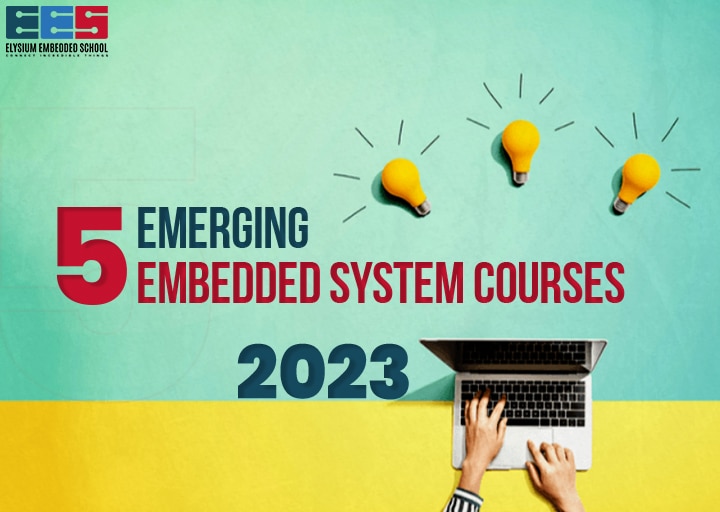
Emerging Embedded System Courses in 2025
November 22, 2022
Gain Good Knowledge of Linux Certification Courses
January 12, 2023
Advance Microcontroller Training Course played a powerful role in creating job opportunities in embedded industry. This domain’s constant and progressive research improved the industry’s efficient, high-performance, low-power consumption microcontrollers. The AVR, PIC, and ARM are excellent examples of this. Therefore, it’s important to learn about microcontrollers for their uses in many processes in machines, appliances, and devices.
Knowing how they work can assist you in transferring within enterprises that use minicomputer power for their devices. Because microcontrollers are utilized for specific tasks, they do not need the additional RAM, ROM, and other peripherals implanted into a single chip that a microprocessor would require to power up a computer. In addition, the most delinquent microcontrollers are getting more intelligent and richer by including the latest transmission protocols like USB, I2C, SPI, Ethernet, CAN, etc. At the end of the class, learners will be capable of working as System design engineers and embedded engineers with fair knowledge of Microcontroller based design.
The course is designed to equip the participants with the required skills on the hardware and software fronts. The training program enables the aspirants to work on the Architecture, Pin- diagram, Input/output interfacing, Exposure to embedded C, and also to set up & customize a microcontroller development environment. The course contents are revised in sync with the latest trends in the industry. The course imparts a solid understanding of Microcontrollers which recreates a significant role in the design and development of Embedded systems. An implanted approach combines hardware and software to produce a complex system with high performance.
The course is designed to provide in-depth knowledge of the Advanced microcontrollers Training Course in embedded systems. The course highlights hardware and software, enabling us to face challenges in designing and developing state-of-the-art embedded systems. The training program helps the aspirants work on the Architecture, Pin diagram, Input/Output interfacing, Exposure to embedded C programming, and set up & customize a microcontroller development environment. Daily, our lives are becoming more dependent on embedded systems, from smartphones, air conditioners, cars, etc. As a result, the use of embedded systems is virtually limitless. So, the need for well-trained embedded systems engineers is an ever-growing demand.
Table of Contents
What is this Advance Microcontroller Training course about?
The Embedded System, Microcontroller course Coaching involves Learning by using state-of-the-art infrastructure to execute hands-on exercises and real-world simulations. This comprehensive hands-on knowledge in Embedded Systems Microcontroller training guarantees that one immerses in the knowledge and talents that the industry requires. Depending upon one’s initial knowledge of C programming and understanding of the Microcontroller Board, one can enroll in a Basic or Advanced Microcontroller Training Course.
The course is designed to provide in-depth knowledge of the Advance Microcontroller Training Course in embedded systems. The course emphasizes hardware and software, enabling us to face challenges in designing and developing state-of-the-art embedded systems. The training program enables the aspirants to work on the Architecture, Pin diagram, Input/Output interfacing, Exposure to embedded C programming, and also to set up & customize a microcontroller development environment.
The Advance Microcontroller Training Course is meticulously crafted to transform learners into proficient embedded system developers by combining core theoretical knowledge with extensive hands-on practice. Through this program, participants delve into real-time simulations and exercises using state-of-the-art microcontroller development boards, making the learning process engaging and industry-relevant. Whether you are just beginning your journey or looking to enhance existing skills, the Advance Microcontroller Training Course offers tailored modules that cater to various proficiency levels.
As part of the Advance Microcontroller Training Course, students gain detailed exposure to embedded C programming, system architecture, and peripheral interfacing. The course also teaches how to configure microcontroller environments, analyze circuit diagrams, and solve real-world engineering problems. From designing embedded systems for industrial automation to creating IoT-based solutions, the Advance Microcontroller Training Course empowers individuals to innovate confidently. Completing the Advance Microcontroller Training Course at Elysium Embedded School equips learners with the expertise required to thrive in core embedded roles, making it an indispensable choice for future-ready engineers.
Need of Advance Microcontroller Training Course
As sensing the growing requirement for trained and well-educated professionals in the Robotics field, Microcontroller Training has its importance. This training course is best per industry standards to learn basic and advanced features of Microcontroller. After Microcontroller training, an individual will gain sufficient knowledge of the Analog Peripherals and memory selection at chip-level computers.
Various Sectors in which you will get Embedded Systems Jobs are Medical Electronics, Aerospace, Automobiles, Defence, Toys, Consumer Electronics, Food industry, Telecommunication, Industrial machines, Space, Agriculture, and Construction.
As the demand for automation and intelligent electronic devices rises, the Advance Microcontroller Training Course becomes essential for those looking to enter the world of robotics and embedded systems. This course not only covers the theoretical framework of microcontroller operations but also emphasizes practical application through real-world projects. By learning embedded C, I/O interfacing, and architecture-level design, students gain hands-on experience that aligns with industry expectations and future-proof technologies.
The Advance Microcontroller Training Course prepares learners to meet the growing employment demand across various sectors such as Medical Electronics, Automotive Systems, Aerospace Engineering, Consumer Electronics, and Telecommunication. Whether designing industrial automation systems or working with smart gadgets, this training empowers professionals to apply their skills in high-demand fields. With embedded systems becoming integral to modern infrastructure, mastering the Advance Microcontroller Training Course opens doors to long-term career success and innovation.
Mastery of Microcontroller Architecture and Features
Through this course, individuals gain proficiency in key areas such as analog peripherals, digital signal processing, memory selection, and power management at the chip level. This knowledge allows learners to build efficient and optimized microcontroller-based circuits that are widely used in today’s smart devices and industrial applications.
Industry-Relevant Practical Knowledge
The training emphasizes real-time system development by covering essential concepts such as pin configurations, I/O interfacing, embedded C programming, and development environment setup. This hands-on approach ensures that students are well-prepared to tackle challenges in actual job roles across embedded domains.
Wide Career Opportunities Across Major Sectors
Graduates of the Advance Microcontroller Training Course can explore numerous job opportunities in sectors such as Medical Electronics, Aerospace, Automobiles, Defence, Toys Manufacturing, Consumer Electronics, Food Industry, Telecommunications, Industrial Machinery, Space Research, Agriculture, and Construction. The versatility and high demand for embedded systems professionals make this course a valuable investment in a long-term technical career.
Importance of Advance Microcontroller Training Course
With the growing demand for skilled and knowledgeable professionals in the field of robotics and embedded systems, the Advance Microcontroller Training Course has become an essential foundation. This training equips individuals with in-depth knowledge of both basic and advanced microcontroller functionalities. It provides the theoretical understanding and practical experience needed to meet current industry expectations. Through this course, learners gain expertise in analog peripherals, digital interfacing, and memory selection for chip-level computing systems.
Industry-Aligned Curriculum for Technical Excellence
The Advance Microcontroller Training Course is tailored to match the latest industry trends and technological advancements. It prepares students to handle real-world challenges in designing embedded systems using microcontrollers like AVR, PIC, and ARM. The curriculum includes key concepts in embedded C programming, circuit designing, input/output interfacing, and system debugging. By focusing on practical implementation, the course ensures that learners can build reliable, high-performance embedded solutions.
Learn with Industry-Skilled Professionals
The Advance Microcontroller Training Course is led by highly experienced professionals from the embedded systems industry. These trainers bring real-world insights and up-to-date knowledge into the classroom, ensuring that learners receive practical education aligned with current technological trends. Their expertise helps bridge the gap between academic concepts and industry expectations, preparing students for core technical roles.
Intensive Hands-On Experimental Sessions
Learning by doing is a critical part of this course. Through intensive lab sessions, students work directly with microcontroller hardware, programming environments, and interfacing modules. These experimental sessions provide valuable exposure to real-time embedded systems design, enabling learners to build and test circuits, troubleshoot systems, and simulate industry-relevant scenarios with confidence.
Well-Structured Curriculum for Deep Learning
The course is meticulously designed to offer a comprehensive learning experience, covering both basic and advanced concepts in microcontroller technology. From architecture and pin configuration to real-time interfacing and embedded C programming, every topic is carefully selected to ensure a thorough understanding of the subject. This structured approach ensures students build a solid foundation and progress to advanced applications smoothly.
Personalized Attention and Mentoring
At Elysium Embedded School, we understand that every learner has unique strengths and challenges. That’s why our trainers provide personalized support, one-on-one doubt clearing sessions, and project guidance to ensure individual progress. This attention ensures that no student is left behind and everyone achieves mastery at their own pace.
Project-Based Tasks and Real-Time Application
Each module is accompanied by hands-on assignments and live projects that replicate real-world embedded system challenges. Learners get the opportunity to design, implement, and test microcontroller-based applications, such as motor control systems, sensor networks, and automation circuits. This approach not only enhances problem-solving skills but also builds confidence to work on industry-level embedded projects.
Career Scope After Microcontroller Training
The microcontroller industry’s hub for semiconductor design offers tremendous job opportunities. However, if you enter this field, you can handle the respective job opportunities. The country requires tons of core professionals to create all that is possible. Therefore, the microcontrollers industry provides you with a lot of career options. It is because of the vast applications of microcontroller-based products. However, most of the roles can be grouped under broad categories.
A lot of career opportunities are available in embedded systems. Some of them are as follows:
Embedded Software Engineer
An Embedded Software Engineer is responsible for writing code that directly interacts with hardware. These professionals design and develop firmware using languages like Embedded C or C++, ensuring microcontrollers perform specific tasks accurately and efficiently. They often work on real-time operating systems and optimize programs for speed and low memory usage.
System Software Engineer
System Software Engineers focus on creating low-level software that manages and controls hardware resources. In the context of microcontrollers, they handle drivers, bootloaders, and system integration components that bridge the gap between hardware and application layers. Their role is crucial in ensuring stability, scalability, and real-time performance of embedded systems.
Application Software Engineer
Application Software Engineers design user-facing applications that may interact with embedded systems. Their work involves creating interfaces, managing data flow, and ensuring seamless integration with other systems. In microcontroller projects, they often help develop control panels, mobile apps, or desktop utilities that communicate with embedded devices.
Software Test Engineer
Software Test Engineers are critical in validating the performance, functionality, and reliability of microcontroller-based systems. They write test cases, perform unit and integration testing, and simulate real-time scenarios to ensure that software performs well under various conditions. Their goal is to identify bugs before deployment.
Embedded Hardware Engineer
Embedded Hardware Engineers design the actual circuits and boards that house microcontrollers. They are skilled in PCB design, analog and digital signal processing, and component selection. Their expertise ensures that the hardware supports software requirements and functions reliably in the intended environment.
Embedded System Trainer
An Embedded System Trainer imparts knowledge of embedded systems, including microcontroller architecture, programming, and hardware integration. These professionals play a crucial role in upskilling students and corporate employees, making them industry-ready. Trainers often work in technical institutes or training divisions of tech companies.
Why Elysium Embedded School is the Best Choice for Advance Microcontroller Training
Elysium Embedded School is widely recognized for delivering top-tier training in embedded technologies. Our Advance Microcontroller Training Course is specifically designed to bridge the gap between academic learning and real-world industrial applications. Through a carefully crafted curriculum and immersive hands-on experience, we empower students to become proficient in designing and developing cutting-edge microcontroller-based systems.
Real-Time Practical Training on Industry Projects
At Elysium Embedded School, we believe in learning by doing. Our training includes practical sessions with real-time projects that simulate actual industry challenges. Learners get the opportunity to work on fully functional microcontroller circuits, gaining expertise in hardware interfacing, programming, and debugging. This experiential learning approach ensures our students are job-ready from day one.
Expert Trainers with Rich Industry Experience
Our faculty team consists of highly experienced professionals and embedded system developers who have worked extensively in the industry. They bring their knowledge and insights directly into the classroom, providing students with guidance on the latest tools, advanced PIC microcontrollers, and real-world problem-solving methods. Their mentorship helps students understand not only how but why systems are designed a certain way
Curriculum Aligned with Modern Industry Standards
The course syllabus is updated regularly to match current trends and demands in the embedded industry. It covers key areas such as microcontroller architecture, pin configuration, peripheral interfacing, embedded C programming, and setting up customized development environments. This ensures that students are equipped with the knowledge and skills that employers are actively seeking.
A Launchpad for High-Growth Careers
Elysium Embedded School’s training opens doors to exciting career opportunities in both domestic and international markets. Our alumni have secured roles in leading MNCs and startups as Embedded Software Engineers, Hardware Designers, IoT Developers, and System Integration Specialists. We provide strong placement support and career mentoring to help students confidently enter and grow in the embedded domain.













